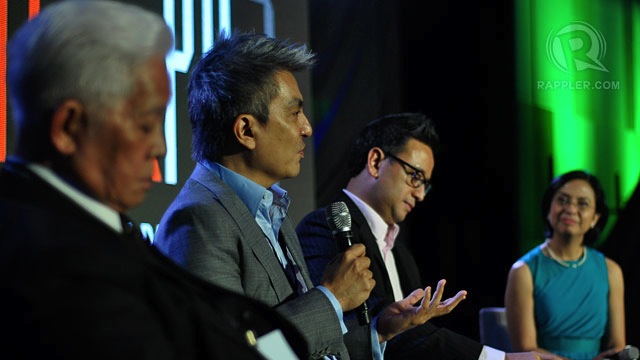SUMMARY
This is AI generated summarization, which may have errors. For context, always refer to the full article.

MANILA, Philippines — “Will it be good if social media has a greater influence over the voters? Definitely, yes. It (campaign) becomes cheaper for candidates. It means there would be more candidates to choose from.”
It’s all about the money, United Nationalist Alliance (UNA) strategist and spokesman Rep Toby Tiangco said during Rappler’s #ThinkPH summit on Friday, August 23. He was reacting to optimistic discussions that Internet penetration in the Philippines will rise to 99% towards the 2016 presidential elections.
“If the shift goes to social media, it becomes cheaper for candiates to run. More candidates will participate in the electoral process,” he added.
But it’s all hypothethical for now. Tiangco remains a skeptic about the power of social media in 2016. Even if Internet penetration rate rises to 99%, Tiangco said the other question is: Will social media be the basis for people to make decisions during elections?
Team PNoy spokesperson Rep Miro Quimbo shared Tiangco’s skepticism. While the Internet may be available in most areas in the Philippines by 2016, Quimbo said, the other question is: Is it going to be affordable?
He said the May 2013 polls also showed that the Internet was not a major player. “The victory of Grace Poe is, in a sense, an anti-thesis of that today. It is not to denigrate the power of social media but she completely represents somebody whose activity in the Internet was miniscule but the amount of votes she got and the distance she left number 2 was so wide,” Quimbo said.
In her presentation, Rappler executive editor Maria Ressa acknowledged that the Internet was not powerful enough to get a candidate elected in the May polls, but it has become very significant that politicians could not ignore it. She cited the case of Sen Cynthia Villar, who posted better numbers in the pre-election surveys than in the final tally of votes. Villar got a beating in social media before the polls.
READ: Internet can’t get pols elected… yet
TV ads are very expensive and limiting but Tiangco said serious candidates have no choice but to find the money because it’s the primary source of voter information. Citing internal campaign surveys, Tiangco said voters in May 2013 polls got 80% of their information from TV.
“That is why it’s the same people running. Only those who can afford [these ads] maglalakas ng loob na tumakbo,” Tiangco said. (It’s only those who can afford [these ads] who will be emboldened to run.)
UNA cited the coalition’s smaller budget in comparison to Team PNoy as among the reasons why it was walloped in the polls. Team PNoy credited its victory to the endorsement of President Benigno Aquino III.
Inspite of his skepticism, Tiangco said he is looking forward to the day social media gains dominance over TV.
“If majority of Filipinos will use it as a tool to decide whether or not to vote for one candidate, then it becomes an equalizer,” Tiangco said.
Philippine elections saw the rise of the power of TV since Congress lifted the ban on political advertising in 2001. Political advertising has become the most important campaign tool and it has gotten the biggest slice of campaign funds.
When political ads were still banned, power belonged to the local politicians. National candidates had to court them to get a good chance of winning the polls. — Rappler.com
Add a comment
How does this make you feel?
There are no comments yet. Add your comment to start the conversation.